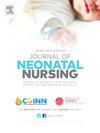Time to start minimal enteral nutrition in low birth weight infants and its predictors: A prospective follow up study
Q2 Nursing
引用次数: 0
Abstract
Background
In Ethiopia the proportion of low birth weight infants is thought to be 17.3%. The purpose of this study was to determine the time to minimal enteral nutrition (MEN) and its predictors in LBW neonates admitted to neonatal intensive care unit in selected hospitals of Addis Ababa, Ethiopia.
Method
An institutional based prospective follow up study was conducted. Both primary and secondary data was used by interviewing mothers and prospective medical chart review of neonates. The Cox regression model was used and variables having a p-value less than 0.05 with 95% CIs in a multivariable analysis were declared as statistically significant association with time to minimal enteral nutrition.
Result
79.4% of them were initiated with MEN. The median time to MEN was 37 h. BW, GA, weight for gestational age, hospital acquired infection, respiratory support and NICU location (hospital) were found to have a statistically significant association with time to initiate minimal enteral nutrition.
Conclusions
As early of initiation of minimal enteral nutrition has a significant role to shorten the time to reach full enteral feeding and reducing malnutrition in the NICU health care staffs treating LBW neonates should consider nutrition as part of the management and special concerns should be given for those who are very preterm and very LBW. Experts in the area and hospitals should prepare feeding initiation protocol to be used across all hospitals and health care staffs to avoid a variation in time to MEN among different neonatal units.
低出生体重儿开始最低限度肠内营养的时间及其预测因素:一项前瞻性随访研究
在埃塞俄比亚,低出生体重婴儿的比例被认为是17.3%。本研究的目的是确定埃塞俄比亚亚的斯亚贝巴选定医院新生儿重症监护病房收治的低体重新生儿的最低肠内营养时间(MEN)及其预测因素。方法采用基于机构的前瞻性随访研究。通过对母亲的访谈和对新生儿的前瞻性医疗图表回顾,使用了主要和次要数据。采用Cox回归模型,在多变量分析中,p值< 0.05且95% ci的变量与最低肠内营养时间有统计学意义。结果79.4%的患者是在MEN开始的。到MEN的中位时间为37小时。体重、GA、胎龄体重、医院获得性感染、呼吸支持和NICU位置(医院)与开始最低限度肠内营养的时间有统计学意义。结论早期开始最低限度肠内营养对缩短低体重新生儿达到完全肠内喂养时间和减少营养不良有重要作用,对低体重新生儿的护理人员应将营养作为管理的一部分,对早产儿和低体重新生儿应给予特别关注。该地区和医院的专家应准备供所有医院和卫生保健人员使用的起始喂养方案,以避免不同新生儿单位的MEN时间差异。
本文章由计算机程序翻译,如有差异,请以英文原文为准。
求助全文
约1分钟内获得全文
求助全文
来源期刊

Journal of Neonatal Nursing
Nursing-Pediatrics
CiteScore
2.00
自引率
0.00%
发文量
143
期刊介绍:
Aims & Scope: This is the practical, bimonthly, research-based journal for all professionals concerned with the care of neonates and their families, both in hospital and the community. It aims to support the development of the essential practice, management, education and health promotion skills required by these professionals. The JNN will provide a forum for the exchange of ideas and information between the range of professionals working in this field; promote cooperation between these professionals; facilitate partnership care with families; provide information and informed opinion; promote innovation and change in the care of neonates and their families; and provide an education resource for this important rapidly developing field.
 求助内容:
求助内容: 应助结果提醒方式:
应助结果提醒方式:


